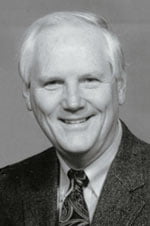The performance of Guilford’s new leadership appeared across the agenda at the college trustees annual September meeting last weekend as everything from security to campus life to the new president, Kent Chabotar himself, came under discussion.This past weekend marked the first trustee meeting under the tenure of President Chabotar.
Trustee meetings are generally not open to the public-and therefore the press-however, Chairman Bruce Stewart agreed to brief The Guilfordian following the conclusion of the meetings last Saturday.
Stewart, a Guilford alum, is pleased with the performance of President Chabotar so far. “I want someone with the wisdom to listen, but to know when to stop listening and start acting,” said Stewart, who believes that Chabotar embodies these qualities.
Stewart believes the president should handle the daily operations of the college. “He’s on the spot-he knows what you need,” said Stewart, commending Kent for informing the Trustees that there would be a change in the college meal plan rather than raising the issue for discussion. He also feels the president should lead the board while serving as a visionary for the college.
Asked about the institution’s financial status, Stewart said it was well-stabilized and generally healthy. He saw the biggest financial challenge facing the school being to build the endowment, though he is encouraged by the success of the Our Time In History Campaign in surpassing its goal of $50 million well ahead of schedule.
When asked his views on the role of consensus in governing the college, Stewart said, “for me personally, I see the consensus process as important for broad questions facing the school.” Stewart cited the college’s discussions of whether to end institutional segregation back when he was a student in the late 50’s and early 60’s as an example of when he felt consensus was important.
Stewart believes there are different levels of consensus. He cited three categories: an advisory relationship, a delegation in charge of making a decision and full participation of the community. He feels that it is important to let people know what their role will be before their input is sought.
“What you owe people is a careful listening, hearing,” said Stewart. “[Do] not come in with your mind made up and go through the rain dance having predetermined it’s not going to rain.”
“Listening does not always mean concurrence,” he added, saying that sometimes Quakers mistake disagreement for a failure to listen.
As for determining how each decision should be handled, Stewart said President Chabotar “has a real sense of what belongs where-that’s leadership.”
The trustees got a taste of Chabotar’s leadership style during their sessions last weekend. Dean for Campus Life Anne Lundquist noted that President Chabotar organized the weekend differently from previous trustee sessions by delegating more work to sub-committees, who then reported to the board, rather than scheduling the full board for the initial discussion.
Lundquist was generally pleased with the board meeting, but noted that her committee, Student Life, did not cover everything on their agenda. “We had too much to cover in too little time,” she said, hoping the board will continue their discussions in January.
Lundquist said the Student Life Committee was interested in hearing the concerns of the Campus Life administrators, many of whom assumed their positions over the summer. The recent changes in the Office of Public Safety and meal plan options topped the new dean’s concerns, as did issues surrounding student involvement in extra-curriculars. Lundquist noted that some students feel there is nothing happening on campus, and indicated this was an issue that needed further discussion.
Stewart reported that the board had been briefed about the presence of Allied Security on campus as the new security department, and was told there were three to four potential candidates for Director of Public Safety and a full background search of the candidates was underway. Stewart warned against rushing the process of hiring a new director. “You better have a secure person doing security,” he said, adding that he felt Interim Director John Jenkins was doing a fine job.
Another issue explored in the Student Life Committee was the potential for growing tensions between Guilford’s three student bodies-main campus, CCE and early college-over various issues such as parking, and what the college could do to minimize tensions from arising. “We can prevent [conflict] if we do a good job,” said Lundquist.
Lundquist also said that in recent years, through her work at Greensboro College prior to returning to Guilford, she noticed an increase in parents’ efforts to be involved in the lives of their students. “I’m going to spend more time on parent education,” she said, saying that part of the college experience for students was learning to make decisions on their own.
Stewart said that the trustees were enthusiastic about Lundquist’s reports.
Lundquist feels the trustees were very interested in hearing student opinions. She noted that Community Senate President Naz Urooj and CCE student government President Kim Forbes both gave presentations to the board on student concerns.
Senior Dan Palmer was part of a panel of students assembled to give a presentation to the board on Guilford’s study abroad programs. “I think one of the most interesting questions we were asked was ‘how did going abroad change your view of Sept. 11?’,” said Palmer. Palmer, who went to Brunnenburg last spring after being on campus the day of the attacks, said it was “interesting being exposed to people with different views.” He mentioned one man strongly opposed to the United States, “even more radical than you see at Guilford.”

